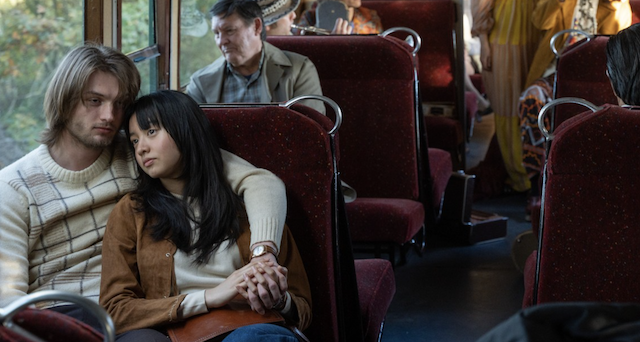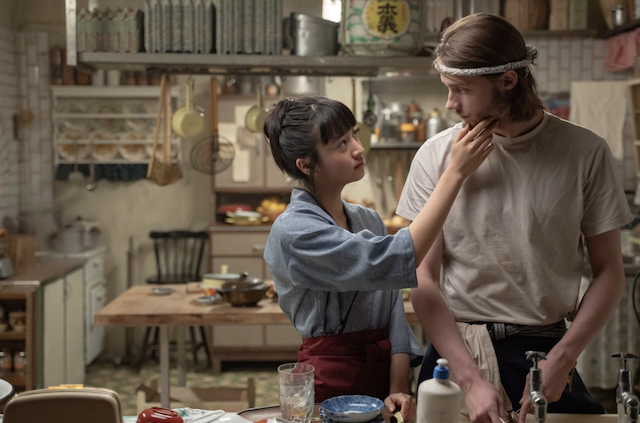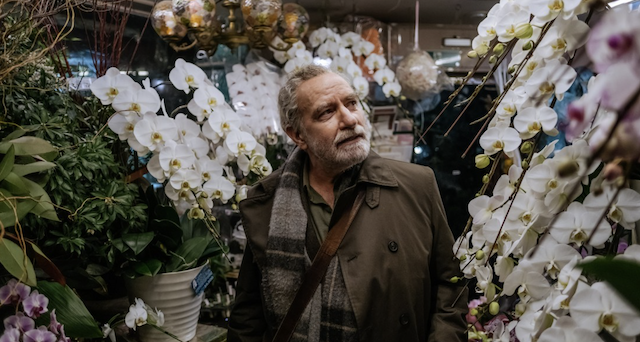
©Courtesy of Focus Features
Touch : A romantic and thrilling story that spans several decades and continents; TOUCH follows one widower’s emotional journey to find his first love who disappeared 50 years ago, before his time runs out.
Director : Baltasar Kormákur
Producer : Baltasar Kormákur, Agnes Johansen, Mike Goodridge
Screenwriter : Baltasar Kormákur, Ólaf Ólafsson
Distributor : Focus Features
Production Co : RVK Studios, Good Chaos
Rating : R (Some Sexuality)
Genre : Romance, Drama
Original Language : English
Release Date (Theaters) : Jul 12, 2024, Limited
Runtime : 2h 1m

©Courtesy of Focus Features
Exclusive Interview with Actress Kōki
Q: This film is based on the original book by Olaf Olafsson. Did you have a chance to read it? If so, what was your impression of the book and did that make you decide to tackle this project?
Kōki: I was instantly captivated and just fell in love with the book. It’s easily one of my favorite books right now. I’m sure it’s going to be a favorite book of my life because it had such a big influence and impact on me. I really loved how delicately and beautifully the love and emotions were portrayed. Yeah, I really fell instantly in love with it.
Q: Most people in the U. S. associate director Baltasar Kormákur with his action films like “Two Guns,” “Everest” or “Beast.” He did some Shakespeare’s plays and a Chekhov play in the past. What fascinated you or stood out for you in his taking this direction?
Kōki: I was extremely grateful that he was so patient with me. It was my second film and there were obviously so many things that I didn’t know as an actor and performer. He would patiently teach me every single step with really detailed direction until I actually understood it. Something I was really amazed about was how open minded he was.
He was also very open to his team about creativity. He would listen to every single opinion and thought from his team and incorporate that in his work. I was truly amazed how he prioritized teamwork and listened to every single opinion. Through his passion towards the work, and his directions, personality and character, he’s such a lovely person to work with.
Q: Though some people might have wondered why he hired his actual son to play in this film, when you see the film, he was really perfect for his role. What conversation did you have with Palmi prior to filmmaking? What did you do to create the dynamic of your character between Miko and Kristófer?
Kōki: I feel really grateful that I was able to work with Palmi [Kormákur,] and was really happy that Kristófer [came alive through him]. I felt absolutely no anxiety or fear or any kind of negative feeling when I was with him. He made me feel very safe, comfortable and open. I felt like I could really be myself with him. I think he really helped me. I’m really grateful.
Q: What’s engaging about this film is that it’s really authentic when it comes to Japanese culture compared to some of the Hollywood films. The author Olaf Olafsson used to work at Sony and knew a lot about Japanese culture. The Older Miko, played by Yoko Narahashi, is also the casting director for this movie and others like “The Last Samurai” and “Sayuri.” They seem to steer into the right direction of this Japanese culture. talk about working on the set with all those creations of the Japanese atmosphere and culture?
Kōki: I was really intrigued at how accurately the Japanese traditional [elements] were portrayed. I loved how different cultures were mixed and emerged in the story. For example, having Japanese actors also working in Nippon, really helped them make that place come alive in a way.
Then I remember the cast, the director and the team were saying how Motoki, when he came into the kitchen as Takahashi, it was almost like the kitchen was a real place. He really made the kitchen of the place, Nippon, seem alive. I think Motoki san had a really huge impact on making that place real
Q: In order to tap into this role of Miko, what research did you do to learn about the Japanese people in the ‘60s in London? Talk about what kind of research you did for the Hibakusha, the atomic bomb victims, which we learned in school. We didn’t not really learn about what was the effect afterwards.
Kōki: First, that’s not the main plot of the story for “Touch,” but I thought it’s important to do some research about the Hibakusha [survivors of the atomic bombing of Hiroshima], the history of Japan and this huge event [the bombing of Hiroshima].
Also Baltasar made sure that I was knowledgeable and informed about the past, the history about Japan and people living in London in the ’70s and ‘60s. I had no information about it. He really taught me a lot, and then we did some research together. We did a very teamwork kind of thing.

©Courtesy of Focus Features
Q: What conversations did you have with Yoko Narahashi — who played the older version of Miko — to make her a seamless character, even though there was a 50-year gap between them.
Kōki: Something I was amazed and surprised about was that she came to the set to see me acting. Even though she didn’t have the scenes there, she would still watch my acting. And something really stayed in my mind was that she asked me, “What do you think when you see Kristófer? What comes to mind when you see him?”
Then, I said to her, “There’s a very beautiful lake, a place in Iceland (I forgot the name right now), but I said, that’s the thing that comes to mind when I see Kristófer’s eyes.” Then she said, “Oh, I’ll really remember that when I act with the older Kristófer. She said she would incorporate that in her acting as the older Miko as well.
Q: You briefly touched on this, but can you add more details about working with Masahiro Motoki [Mr. Takahashi, Miko’s father and the restaurant Nippon’s owner]. Not only has he had a great career, but got to see him act on the set. What were the elements that you learned from him that you might probably apply into your acting?
Kōki: I was truly honored that I was able to be so close and able to experience acting with him. Seeing his passion, the effort and determination when he was acting was truly inspiring. I could learn so much from him. For example, how concentrated he was, and then how much he actually thought about his character in the background.
He would really talk with the director about the scenes that were not even written. He would think about the background story, the things that were not in the script as well. I remember thinking, “Ah, he thinks this much about the character, even outside of the story.” That was really inspiring. I was able to learn so much — that passion is really important. It was just really amazing.
Q: When you were younger, you used to visit your father’s set when you were growing up. Your father is revered by a lot of colleagues because of how he treats actors and staff. What elements did you learn from your father that you might apply to future projects as an actress?
Kōki: Actually, I haven’t been able to go to any.
Q: You haven’t?
Kōki: There was only one time I was able to go. After I asked him a hundred times if I could go and see him on set, he was like, “Okay, fine, you can come.” I was able to see only one scene when he was doing “The Legend & Butterfly.” It was a very historical movie, a traditional Japanese movie.
I was “Wow,” and out of words when I saw him acting. His presence he has when he steps onto the set. Then when he’s acting, the whole cast and crew respected my dad, but seeing him acting right there in front of my eyes, that really inspired me to think, “Oh, I want to become someone like him, someone who can really make someone feel a certain way or make them feel so much emotion by watching them.” I was really inspired watching him act.
Q: This film covers a lot of different aspects of cultures here. What were the elements that you learned from making this film that you think that it’s like a great thing to present to Japanese viewers? What things did you find fascinating about this book and this movie that people in Japan should know about?
Kōki: First of all, when I read the book, I felt that it’s really rare to find a very beautiful love story nowadays. I think that’s one of the main points, how beautifully it’s portrayed. I also love the message of the story and the film. It shows the beauty of falling in love with someone and then being able to experience that with such a special memory.
It’s something that becomes a treasure for someone experiencing that. When I watched the movie, I was surprised by how beautiful the images were — and the music as well. Everything is really detailed and you can see how much thought is really in this film. I think the passion, thoughts, determination, creativity, everything is really combined into one film. I want a lot of people to watch it.
Q: Since you star in a foreign films, do you want to balance that out between doing Japanese and foreign films or do you want to dive in and explore more projects in the U. S.?
Kōki: I would love to continue challenging myself in a very vast range, in Japan and outside of Japan as well. I would love to continue challenging myself in different genres, with different teams and as different characters.
If you like the articles, share your thoughts below!
Check out more of Nobuhiro’s articles.
Here’s the trailer of the film.

